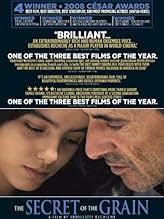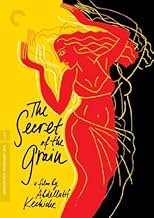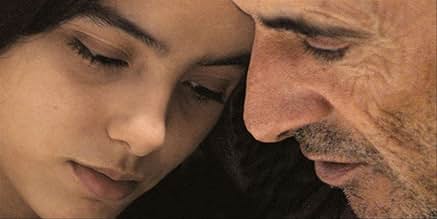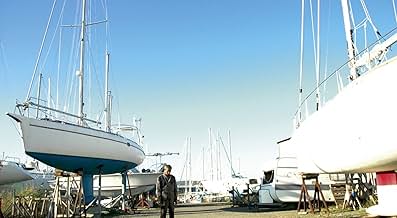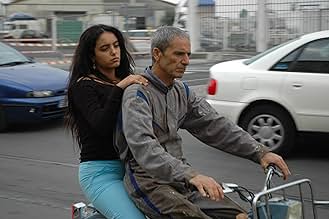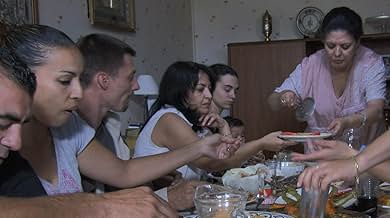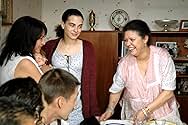IMDb RATING
7.4/10
8.1K
YOUR RATING
In southern France, a Franco-Arabic shipyard worker along with his partner's daughter pursues his dream of opening a restaurant.In southern France, a Franco-Arabic shipyard worker along with his partner's daughter pursues his dream of opening a restaurant.In southern France, a Franco-Arabic shipyard worker along with his partner's daughter pursues his dream of opening a restaurant.
- Director
- Writers
- Stars
- Awards
- 19 wins & 9 nominations total
Nadia Taoul
- Sarah
- (as Nadia Taouil)
- Director
- Writers
- All cast & crew
- Production, box office & more at IMDbPro
Featured reviews
It's the third movie of Abdellatif Kechiche (coming after "La Faute à Voltaire", and "L'Esquive"). All these movies deal in a way or another with the life of Tunisian immigrants in France.
This time in "Couscous" the director wanted to show his own background, the universe of his own family, Tunisian immigrants living in Nice, and especially he wanted to bring a tribute to his father, the man who had struggled for all his life to transmit a sense to all of them. It was not to be a biographical film, what Mr. Kechiche was looking for was to catch an atmosphere, and I would say, to catch the ethos.
The shootings have not been done in Nice, as the director feared to become much too sentimental. The chosen location was Sète instead, a small Mediterranean town, where the fishermen leave on their boats each morning and sometimes reach North Africa or the Asian borders, a town struggling with the same issues as everywhere in Europe nowadays: decline of production and unemployment, with the small shipyard challenged by concurrence, the fishing industry challenged the same.
The director had intended to ask his father to play in the movie and started to look for funding and to organize the team. Meanwhile the father passed away. Mr. Kechiche decided then to put a Tunisian actor in the role of the father. It was Mustapha Adouani, whom the director knew very well. Exactly when shootings were to start, Mr. Adouani fell gravely ill (he died after a few months), so they had to find on the spot another solution.
And the solution they found proved brilliant: they hired a non-actor, Habib Boufares, a worker from Nice, a lifelong friend of the father. The role fitted to him as a glove! Actually almost the whole team is of non-actors. The screenplay details were very loosely followed, the director left to the cast the full liberty to improvise. They were playing their own kind of life after all! And they lived their life there, in front of the camera (it was a hand-held camera , to not impede the non-actors in any way). This movie breathes trough all its pores of life, of authenticity, of immediacy! There are only a few professional actors in the cast. Hafsia Herzi (a young actress showing stamina and commitment) plays the step-daughter of the father, a very determined girl, sincerely attached to him and giving full support in difficult moments. There is also Alice Houri, bringing in a secondary role force and sincerity.
I have read the reviews to this movie. Many of them are very critical. The movie is excessively long, they say, and there are a lot of scenes that could have been much shorter without loosing anything. It is a 150 minutes film: one third is devoted to a dinner in family; the mother has prepared fish couscous (you could guess), an endless chat is about anything and nothing; a second third is devoted to a dinner on a boat-restaurant, where everybody is waiting for the main course (fish couscous, you betcha).
Well, it depends on your taste to like this movie or not (it goes the same with the couscous as a dish). I think the director took this risk, to let each scene to unfold on its own, regardless how long it was taking, for the sake of authenticity. He was interested in catching the universe of that community of Tunisian immigrants, in rendering it as natural as it really is; to get this way the ethos of that world. And he needed for this to not interfere in any way: neither by screenplay, nor by camera, nor by editing.
It is a family risking to disintegrate: the parents are separated, one of the sons is cheating his wife, there are tensions with the step-daughter. What keep them strong is the recourse to their specificity when need is: their cuisine, the wonderful plates with fish couscous. And their music and dance, in the most dramatic moments. There is a long scene of belly dance at the end of the movie: I don't want to say more, to not spoil the story. These guys speak only French and follow the French system of values. They keep however their cultural origins as assets.
Some reviewers mentioned "Eat Drink Man Woman" of Ang Lee: there also it is cuisine that keeps family against disintegration. I would mention also in this context "A Touch of Spice": a Greek family forced to leave Istanbul will keep their specific identity by keeping to "Politiky Kouzina", the way Greeks from Istanbul use spices in their dishes.
For me "Couscous" called in mind also "35 Rhums", another French movie whose heroes also belong to an ethnic minority in France.
I think somehow the family in "Couscous" and the movie itself resemble: both could disintegrate, both keep ultimately strong, the family keeping to their cuisine, the movie by keeping to the authenticity of this universe and by getting their ethos.
This time in "Couscous" the director wanted to show his own background, the universe of his own family, Tunisian immigrants living in Nice, and especially he wanted to bring a tribute to his father, the man who had struggled for all his life to transmit a sense to all of them. It was not to be a biographical film, what Mr. Kechiche was looking for was to catch an atmosphere, and I would say, to catch the ethos.
The shootings have not been done in Nice, as the director feared to become much too sentimental. The chosen location was Sète instead, a small Mediterranean town, where the fishermen leave on their boats each morning and sometimes reach North Africa or the Asian borders, a town struggling with the same issues as everywhere in Europe nowadays: decline of production and unemployment, with the small shipyard challenged by concurrence, the fishing industry challenged the same.
The director had intended to ask his father to play in the movie and started to look for funding and to organize the team. Meanwhile the father passed away. Mr. Kechiche decided then to put a Tunisian actor in the role of the father. It was Mustapha Adouani, whom the director knew very well. Exactly when shootings were to start, Mr. Adouani fell gravely ill (he died after a few months), so they had to find on the spot another solution.
And the solution they found proved brilliant: they hired a non-actor, Habib Boufares, a worker from Nice, a lifelong friend of the father. The role fitted to him as a glove! Actually almost the whole team is of non-actors. The screenplay details were very loosely followed, the director left to the cast the full liberty to improvise. They were playing their own kind of life after all! And they lived their life there, in front of the camera (it was a hand-held camera , to not impede the non-actors in any way). This movie breathes trough all its pores of life, of authenticity, of immediacy! There are only a few professional actors in the cast. Hafsia Herzi (a young actress showing stamina and commitment) plays the step-daughter of the father, a very determined girl, sincerely attached to him and giving full support in difficult moments. There is also Alice Houri, bringing in a secondary role force and sincerity.
I have read the reviews to this movie. Many of them are very critical. The movie is excessively long, they say, and there are a lot of scenes that could have been much shorter without loosing anything. It is a 150 minutes film: one third is devoted to a dinner in family; the mother has prepared fish couscous (you could guess), an endless chat is about anything and nothing; a second third is devoted to a dinner on a boat-restaurant, where everybody is waiting for the main course (fish couscous, you betcha).
Well, it depends on your taste to like this movie or not (it goes the same with the couscous as a dish). I think the director took this risk, to let each scene to unfold on its own, regardless how long it was taking, for the sake of authenticity. He was interested in catching the universe of that community of Tunisian immigrants, in rendering it as natural as it really is; to get this way the ethos of that world. And he needed for this to not interfere in any way: neither by screenplay, nor by camera, nor by editing.
It is a family risking to disintegrate: the parents are separated, one of the sons is cheating his wife, there are tensions with the step-daughter. What keep them strong is the recourse to their specificity when need is: their cuisine, the wonderful plates with fish couscous. And their music and dance, in the most dramatic moments. There is a long scene of belly dance at the end of the movie: I don't want to say more, to not spoil the story. These guys speak only French and follow the French system of values. They keep however their cultural origins as assets.
Some reviewers mentioned "Eat Drink Man Woman" of Ang Lee: there also it is cuisine that keeps family against disintegration. I would mention also in this context "A Touch of Spice": a Greek family forced to leave Istanbul will keep their specific identity by keeping to "Politiky Kouzina", the way Greeks from Istanbul use spices in their dishes.
For me "Couscous" called in mind also "35 Rhums", another French movie whose heroes also belong to an ethnic minority in France.
I think somehow the family in "Couscous" and the movie itself resemble: both could disintegrate, both keep ultimately strong, the family keeping to their cuisine, the movie by keeping to the authenticity of this universe and by getting their ethos.
I have heard this film being compared to Eat Drink Man Woman, which is fair enough, if not slightly deceptive. Sure, there's a similar veneration for the art of cooking and how this draws and binds families. But the film casts a wider net than this may suggest. For me, it strongly resembles the humanistic and naturalistic stories of Robert Guédiguian, particularly La ville est tranquille (The Town is Quiet).
The actors are largely non-professionals. The use of long takes, including long stretches of dialogue, is very impressive and suggests that some of the script may be improvisational. I liked the chit-chat, the small details of daily life (like toilet-training a child), that films normally gloss over.
The film has a documentary look and feel and parts are like a fly-on-the-wall at a family gathering. For me, the importance of this is to convey how human this family is, with a rich and warm cultural heritage. In particular, it renders as impotent, irrational fears of Muslim culture.
The film works on multiple levels because it taps into the universal everyday concerns that potentially touch us all in one form or another: prejudice against immigrants, attitudes towards Islam post 9-11, globalisation, ageism in the workforce, the effects of poverty, family breakdown and more. Yet, importantly, the film is not preachy but merely presents life in a matter-of-fact way.
The female performances in the film are particularly affecting, especially the young Hafsia Herzi playing Rym, the daughter of Slimane's lover, and Leila D'Issernio who plays his Russian daughter-in-law.
At 148 minutes, the film is quite long, though this is not apparent until the final scene, which seems to be prolonged in real-time for a particular effect. On paper, the story looks like something we've seen before, but avoids all the clichés we might expect. I loved it.
The actors are largely non-professionals. The use of long takes, including long stretches of dialogue, is very impressive and suggests that some of the script may be improvisational. I liked the chit-chat, the small details of daily life (like toilet-training a child), that films normally gloss over.
The film has a documentary look and feel and parts are like a fly-on-the-wall at a family gathering. For me, the importance of this is to convey how human this family is, with a rich and warm cultural heritage. In particular, it renders as impotent, irrational fears of Muslim culture.
The film works on multiple levels because it taps into the universal everyday concerns that potentially touch us all in one form or another: prejudice against immigrants, attitudes towards Islam post 9-11, globalisation, ageism in the workforce, the effects of poverty, family breakdown and more. Yet, importantly, the film is not preachy but merely presents life in a matter-of-fact way.
The female performances in the film are particularly affecting, especially the young Hafsia Herzi playing Rym, the daughter of Slimane's lover, and Leila D'Issernio who plays his Russian daughter-in-law.
At 148 minutes, the film is quite long, though this is not apparent until the final scene, which seems to be prolonged in real-time for a particular effect. On paper, the story looks like something we've seen before, but avoids all the clichés we might expect. I loved it.
Something unusual happened at the end of this movie projection. Several people not knowing each other gathered at the cinema exit and discussed the movie. It appeared that the movie was spoiled by several cinematographic tics which the director promoted to the status of the style and used all over the movie "ad nausea". He extends the lengthy sequences probably to make us share the uneasiness of the characters in the given situation (the mother scolding the child for weeing in her panties, the guests waiting for the cous-cous, the final run of Slimane and the belly dance). But this is a 0-level translation of the reality into the cinematographic language. The profusion of the very close-ups and the clip-like filming with very short shots is a minor default. It is probably one of the points which makes some people like the movie as "modern". The movie is almost twice as long as usual and I can not find any cinematographic reason to make it this long, if not just the desire to convince the spectator (and jury) that this movie has something exceptional. We spent some good moments but we hope that this gifted director will not be encouraged to belaborates more in his future creations.
Cous Cous is set on the coast of Southern France in a coastal community where traditional industries are dying away. The void opening up with the decline of fishing and boat making industries is considerable, and the sprinkling of tourist interest in the area does little to salve these wounds. The malaise and despondency of the community is encapsulated in the person of Slimane, a taciturn divorcée who is told at the start of this film that he will henceforth receive only part-time employment at the scrapyard where he makes his living.
In the early stages of the film we are also introduced to Slimane's large and diverse family. The family minus Slimane is first brought together for a meal of fish and couscous at the household of Souad, Slimane's former wife. This is the first of several long and engrossing commensal scenes. The rapid, witty dialogue and the skillful close-up camera-work filmed around and among the diners create a remarkable intimacy between the actors and the viewer, so that very soon we are immersed in the family's intrigues and laughing at their bawdy humour.
However, the family is more often in disharmony. The children yearn for Slimane and Souad to resolve their differences, but Slimane is living in a hotel elsewhere in town. The proprietor of the hotel is his new partner and her daughter, Rym, is a close friend. Slimane's children disapprove openly of this situation, but at the same time they have their own problems to face up to, especially the wayward behaviour of Hamid, one of Slimane's sons, who frequently cheats on his fragile wife.
Slimane's despondency intensifies in the wake of his enforced semi-retirement from the scrapyard: he regrets that his family is divided and wishes that he had used his life to create something, to create a legacy for his children. It is in the face of this despair and with the help of Rym, the daughter of the hotel proprietor, that Slimane resolves to create a restaurant on a derelict boat a restaurant for which his ex-wife will cook and which his children will serve in. Rather than turning the rest of the film into a modern-day fairytale, director Abdel Kechiche remains levelheaded and keeps his camera trained on the complex and often strained web of relationships amongst the family members of Slimane's divided family. It is a slow and difficult struggle for Slimane to realise his goal, but Kechiche shows little of the construction of this ship in this long (two and a half hours) film.
In the final stages of the film Slimane is desperate to secure funding for his project and decides to host a grand opening of the restaurant with many eminent local personalities on the guestlist. The dramas and calamities in the protracted finale seem somewhat at odds with the first two-thirds of the film, which is low on drama and feels unstaged (indeed there are many non-professional actors in the cast and probably a considerable amount of improvisation). Nevertheless, as Slimane struggles to ensure that the dinner reaches the diners and the grand opening morphs awkwardly into a long-drawn-out party, the film climbs to a thrilling crescendo and a devastatingly abrupt ending.
In the early stages of the film we are also introduced to Slimane's large and diverse family. The family minus Slimane is first brought together for a meal of fish and couscous at the household of Souad, Slimane's former wife. This is the first of several long and engrossing commensal scenes. The rapid, witty dialogue and the skillful close-up camera-work filmed around and among the diners create a remarkable intimacy between the actors and the viewer, so that very soon we are immersed in the family's intrigues and laughing at their bawdy humour.
However, the family is more often in disharmony. The children yearn for Slimane and Souad to resolve their differences, but Slimane is living in a hotel elsewhere in town. The proprietor of the hotel is his new partner and her daughter, Rym, is a close friend. Slimane's children disapprove openly of this situation, but at the same time they have their own problems to face up to, especially the wayward behaviour of Hamid, one of Slimane's sons, who frequently cheats on his fragile wife.
Slimane's despondency intensifies in the wake of his enforced semi-retirement from the scrapyard: he regrets that his family is divided and wishes that he had used his life to create something, to create a legacy for his children. It is in the face of this despair and with the help of Rym, the daughter of the hotel proprietor, that Slimane resolves to create a restaurant on a derelict boat a restaurant for which his ex-wife will cook and which his children will serve in. Rather than turning the rest of the film into a modern-day fairytale, director Abdel Kechiche remains levelheaded and keeps his camera trained on the complex and often strained web of relationships amongst the family members of Slimane's divided family. It is a slow and difficult struggle for Slimane to realise his goal, but Kechiche shows little of the construction of this ship in this long (two and a half hours) film.
In the final stages of the film Slimane is desperate to secure funding for his project and decides to host a grand opening of the restaurant with many eminent local personalities on the guestlist. The dramas and calamities in the protracted finale seem somewhat at odds with the first two-thirds of the film, which is low on drama and feels unstaged (indeed there are many non-professional actors in the cast and probably a considerable amount of improvisation). Nevertheless, as Slimane struggles to ensure that the dinner reaches the diners and the grand opening morphs awkwardly into a long-drawn-out party, the film climbs to a thrilling crescendo and a devastatingly abrupt ending.
Diane and I attended this wonderful film in Fremantle this morning and both of us left the theater at its conclusion realising that we had seen an unusual film from an unusual ethnic angle and that the director and actors had completed a superb work.
I adore our Australian films because many of them explore the mundane drama of quiet ordinary life and this film is no exception even though it is French rather than Australian. I guess Hollywood does not believe viewers are sensitive enough to pay to see domestic drama and that the subject matter must always be "bigger than Ben Hurr" but our movies as well as many European movies have proved that the examination of quiet aspects of everyday life can provide extremely compelling material for contemporary films.
IMDb commentators found it off-putting to watch long film sequences about potty training, marital squabbles and restaurant scenes; however, this is the stuff of myriad similar domestic situations that we are all familiar with. The genius being that the director can make these scenes rich enough to watch. Diane and I both believe he did this admirably as well as providing much to discuss and reflect upon later.
We both found it different and endearing that we were allowed into the lives of people and their situations that would be closed to us without this delightful film. Yes, I used the adjective "delightful"; the scenes of domesticity were enlightening and compellingly endearing because we are inundated with Western examples of the genre but few (such as in this film) of other ethnic examples.
A film that should not be missed!
I adore our Australian films because many of them explore the mundane drama of quiet ordinary life and this film is no exception even though it is French rather than Australian. I guess Hollywood does not believe viewers are sensitive enough to pay to see domestic drama and that the subject matter must always be "bigger than Ben Hurr" but our movies as well as many European movies have proved that the examination of quiet aspects of everyday life can provide extremely compelling material for contemporary films.
IMDb commentators found it off-putting to watch long film sequences about potty training, marital squabbles and restaurant scenes; however, this is the stuff of myriad similar domestic situations that we are all familiar with. The genius being that the director can make these scenes rich enough to watch. Diane and I both believe he did this admirably as well as providing much to discuss and reflect upon later.
We both found it different and endearing that we were allowed into the lives of people and their situations that would be closed to us without this delightful film. Yes, I used the adjective "delightful"; the scenes of domesticity were enlightening and compellingly endearing because we are inundated with Western examples of the genre but few (such as in this film) of other ethnic examples.
A film that should not be missed!
Did you know
- TriviaShooting was supposed to start in the summer of 2005 but one of the leading actors was sick, which resulted in a major delay. Thus, filming actually started on 5 September 2005 and was still running by 16 January 2006. The set was on a boat in the port of Sète for at least six weeks from October to December 2006. Outside temperatures were very low, as opposed to what they should have been if schedule could have been held. This led the production to set up large tents near the boat with heating systems for the actors and extras to remain comfortable between takes.
- ConnectionsFeatured in Maltin on Movies: Flipped (2010)
- SoundtracksEl fan hob wa imane
Written by Mohamed Abdel Wahab and Hussein El Sayed
- How long is The Secret of the Grain?Powered by Alexa
Details
Box office
- Gross US & Canada
- $86,356
- Opening weekend US & Canada
- $9,850
- Dec 28, 2008
- Gross worldwide
- $14,776,783
- Runtime
- 2h 31m(151 min)
- Color
- Sound mix
- Aspect ratio
- 1.85 : 1
Contribute to this page
Suggest an edit or add missing content

